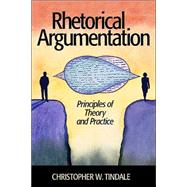
Note: Supplemental materials are not guaranteed with Rental or Used book purchases.
Purchase Benefits
What is included with this book?
| 1. Introduction: A Rhetorical Turn for Argumentation | |
| Alice's Predicament | |
| Models of Argument | |
| Beyond the Logical | |
| Beyond the Dialectical | |
| Rhetoric and Rhetorical Argumentation | |
| The Path Ahead | |
| 2. Argument as Rhetorical... | |
| Introduction: Rhetoric's Origin | |
| Argument's Origin | |
| Rhetoric and Argument in Fifth- and Fourth- Century Greece | |
| Sophistic Argument | |
| Sophistic Argument and the Notion of 'Fallacy' | |
| Rhetoric as Invitational | |
| 3. ...And Rhetoric as Argument | |
| Introduction: Dialogue and Dialogues | |
| Bakhtin's Terminology | |
| Dialogic Argument | |
| Reflections on a Bakhtinian Model | |
| Examples | |
| Conclusion | |
| 4. Martians, Philosophers, and Reasonable People: The Construction of Objective Standards | |
| Introduction | |
| How Martians Reason | |
| The Martian Standard and the Problems of Evaluation | |
| Bakhtin's Superaddressee | |
| Perelman and Olbrechts-Tyteca's Universal Audience | |
| Conclusion | |
| 5. Developing the Universal Audience | |
| Introduction: Why the Universal Audience Fails | |
| Reading the Universal Audience | |
| Reappraising the Universal Audience | |
| Applying the Idea of a Universal Audience | |
| 6. The Truth About Orangutans: Conflicting Criteria of Premise Adequacy | |
| Introduction: Deep Disagreements Between Logic and Rhetoric | |
| Hamblin's Orangutans | |
| The Rhetoric of Philosophy: Metaphors as Arguments | |
| Acceptability | |
| Conclusion | |
| 7. Rhetorical Conclusions | |
| From Protagoras to Bakhtin | |
| The Rhetorical Audience | |
| Goals of Rhetorical Argumentation | |
| Conclusions Without Conclusiveness |
The New copy of this book will include any supplemental materials advertised. Please check the title of the book to determine if it should include any access cards, study guides, lab manuals, CDs, etc.
The Used, Rental and eBook copies of this book are not guaranteed to include any supplemental materials. Typically, only the book itself is included. This is true even if the title states it includes any access cards, study guides, lab manuals, CDs, etc.